Mindfulness in the Classroom Transcript
GFX:
TCH
TeachingChannel
+++ 00:00:07 +++
Anne Mechler: Okay, focus on your breath.
Anne Mechler: We never know what our kids are coming with as far as just the baggage, where they’ve-- the drive to school, traffic, what it was like in the morning, did they wake up on time, did they get breakfast.. at all? The one thing that we can do as a staff is greet our children in a positive way so they’re there going [exhales] “This is a welcoming place, a welcoming face,” and it’s kind of a new start if they need one.
Card:
Creating Success in Middle School:
Mindfulness in the Classroom
Anne Mechler: Good morning! Oh, glad you’re back. Hi, good morning. How are you? Okay, besides Friday, what is today?
Lower third:
Anne Mechler
5th Grade Teacher
Momentous School, Dallas, Texas
+++ 00:00:48 +++
Anne Mechler: The lesson that I chose for today, being May 1st, was about focus. And I chose the lesson because it’s the kind of month that’s a little bit like the holidays, you know? We start to lose focus and we start to get anxious and anxiety sets in and ends up not being super-fun, because we’re all so worried about so many other things, but when you think of May, when you just think of the month of May, what comes to your mind?
+++ 00:01:15 +++
Student: Spring.
Anne Mechler: Spring.
Student: Pink.
Anne Mechler: Pink.
Student: Flowers.
Anne Mechler: Flowers.
Student: Yellow.
Anne Mechler: Yellow.
Student: Sun.
Anne Mechler: The sun.
Anne Mechler: I wanted them to think more of like, activities and they were saying, “Flowers and bees,” and they were being so sweet.
+++ 00:01:31 +++
Student: Close to the end of the year.
Anne Mechler: Close to the end of the year. And so our lesson today is all about how we can actually be in the moment. When we think about focus, we do think about reading a lot.
Anne Mechler: So I had them think about it for a moment, “Close your eyes, get something in your mind, think about it. What does it mean to be present?” That was kind of our focus question for the day. And then get with their partner to go and kinda do a walk and talk and then to write things down on Post-It notes.
Lower third:
Michelle Kinder
Executive Director
Momentous Institute, Dallas, Texas
+++ 00:02:04 +++
Michelle Kinder: We’re all about social-emotional health. Our vision is social-emotional health for all kids so they can achieve their full potential. Our bias is that they do so well long-term because we invest in social-emotional health. For us, that’s understanding that social-emotional health, which is a fancy word for “Can you control yourself? Can you manage your emotions? Can you build relationships? Are you empathetic? Optimistic?” All of those things that employers look for-- I mean, you look for in your friends.
+++ 00:02:37 +++
Anne Mechler: Everybody, together, read that.
Students: What does it mean to be present?
Anne Mechler: Okay. So I want you guys to close your eyes for just a moment. I’m gonna say that question again while you imagine and visualize what it means to be present. So close your eyes for just a moment.
+++ 00:02:54 +++
Anne Mechler: When we came back from summer about five or six years ago-- I can’t remember how long ago it was-- and we’re ready for our professional development and we found out that we were all getting a chime and we were gonna start Mindfulness lessons. It was all new. These were new lessons. At first I thought when in the world am I gonna do this and prepare them for a state test? Ahh! But it kinda just started becoming just the norm. It helped me in conversations with children that were struggling, whether they were struggling with another student, struggling at home--
+++ 00:03:29 +++
there’s so many things you can imagine. The children develop an attitude of “If I think I can, I will.” It is a growth mindset. It’s-- yeah, it’s hard and there are struggles involved, but I have strategies to get through that now. And I’m gonna keep working and keep fighting.
Anne Mechler: I’ll give the signal. Go ahead.
Student: What do you think is to be present?
Student: I think it means to be attentive and paying attention. And what do you think it means to be present?
Student: I think that to be focused and what’s happening around you.
+++ 00:04:06 +++
Anne Mechler: It doesn’t have to be walking when we do the walk-and-talk strategy. It can be going to a location, especially if they have to write. And it’s just a matter of getting them up out of their seat, going somewhere, having that choice of where they would like to go, having the choice of what Post-It note to choose. It gives them a little more control, which children love. We all do.
Student: To listen and focus on what is around you.
+++ 00:04:31 +++
Anne Mechler: As I was listening to you with your partners I heard some great responses on “What does it mean to be present?” The challenge I have for you now as we share out is to give me one specific example.
Student: To be in the moment and not worry what it’s after.
Anne Mechler: Okay. Do you have an example?
Student: The STAAR test.
Anne Mechler: Nice one. Thank you. And thank you for taking a risk. I appreciate that. Excellent.
Student: Being present means be in the moment, realize that your doing something.
+++ 00:05:04 +++
Anne Mechler: Okay, do you have an example?
Student: Like, when you’re playing video games you have to be in the moment so that way you realize what to do.
Anne Mechler: Oh, yeah, that’s a good one.
Anne Mechler: So as a teacher I’m listening and I’m thinking, “Well, they’re all saying about the same thing,” kind of. There were a few that were different and they kind of stepped out of that comfort of saying, “I’m in the moment.” And I thought, “I’ve got to do some more teaching here,” ‘cause I want them to go beyond or “what do you mean ‘specifically’?”
+++ 00:05:33 +++
Anne Mechler: We have a lot of similar ideas, right?
Student: Yes.
Anne Mechler: Okay, well, I have this great book that I’m gonna read. Oh, my, it just so happens, “What Does It Mean To Be Present?”
Anne Mechler: And I was thinking that book that I read “What Does It Mean To Be Present?” would also let them see that there’s more ways of being present than just being in the moment.
+++ 00:05:53 +++
Anne Mechler: “Allowing the rhythm of your breath in and out, in and out, to make you feel peaceful. Closing your eyes and being still enough to hear your inner voice.” Did you guys hear anything in the book that we maybe didn’t put up here? Yeah, what’d you hear?
Student: To take turns or wait for your turn.
Anne Mechler: Take turns. Okay. What did you hear, Israel?
Student: Cuddling with your dog.
Anne Mechler: Cuddling with your dog. Absolutely.
+++ 00:06:23 +++
Anne Mechler: And then, just to kinda sum it all up, we did a focused breathing activity, which is called a body scan. And there are multiple ways that you can do that. Go ahead, sit up nice and straight. You’re gonna listen to my voice, okay, close your eyes, focus on going down your arm to your wrist and now to the palm of your hand and down and up and up and down to your pinky. And then you can slowly and gently open your eyes.
+++ 00:07:00 +++
Anne Mechler: Kids would come in, like, from lunch-- energy’s here-- and it’s like, well, we got science here or we’ve got reading to do or we’ve got math. I need to get them calmed down. Instead of saying, [mimicking irritation] “Calm down. I’m waiting. We have work to do,” or, you know, “love the way So-and-so is,” which is all great. Those are good strategies. They’re very fine and dandy. This is to add another strategy that, for me, became something I looked forward to.
Anne Mechler: Great focus. Can anybody tell me why we do that? Tell me why, Joshua?
+++ 00:07:35 +++
Student: To calm ourselves down and to get prepared for the day.
Anne Mechler: Mm-hm. That’s great. Yeah, absolutely. Okay, so here’s what we’re gonna do to close this. We’re gonna have a reflection. I want you to write your reflection in your writing notebook, okay? Where are you gonna write it?
Students: Writing notebook.
Anne Mechler: Perfect. So you’re gonna reflect. You’re gonna answer this question, but it’s gonna be more on a personal level. What does it mean for you to be present and what are you gonna work on over the next couple of months?
+++ 00:08:15 +++
Anne Mechler: Is there anybody that would like to stand up and share their own personal goal? Okay. Let’s start with Abel. I think his personal goal is great.
Student: My goal is to complete my work so I can go on field trips and participate in other activities that are coming up and to be present.
Student: My personal goal is to breath when my mom wants me to repeat something I just said.
+++ 00:08:42 +++
Michelle Kinder: Our kids are graduating high school ninety-seven percent. Eighty-six percent are going on to higher education and eighty-eight percent of those kids are persisting. And we-- you know, that matters to us because we know we’ve gotta show an academic link in order to engage the doubters out there.
Student: My personal goal is to pay attention and bring my homework complete.
+++ 00:09:05 +++
Anne Mechler: I’m seeing children that are in a comfortable atmosphere where they can communicate. They communicate well. They’re not afraid to take risks-- academic success. I’m seeing children that can walk into a testing environment: They’re not stressed out, they know what’s expected.
Anne Mechler: If you have a Post-It note that you want to add to our chart, you may go ahead and do that.
+++ 00:09:27 +++
Anne Mechler: I would not teach without teaching these lessons-- these social-emotional lessons. I would not go back to my old way of teaching at all. And they can be integrated, too. And so I integrated a lot of them into my science lessons. So you can be really creative in how you bring them in and I know they work. I know building community in a classroom and building that safe environment where they can come in and be themselves is a place that kids are gonna want to be. And if they want to be somewhere, they’re learning and they’re moving forward.
GFX:
Tch
TeachingChannel
#### End of C0804_003003_Mechler_Class.FINAL_SD.mp4 ####

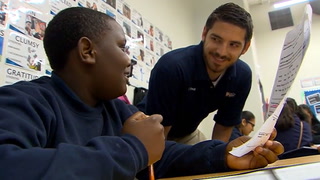
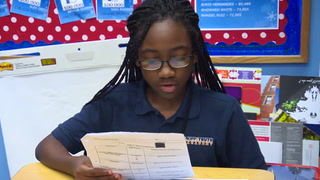
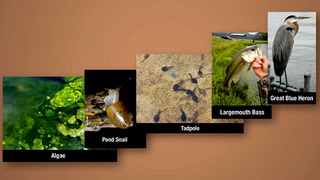
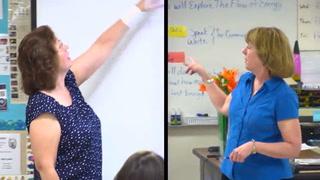
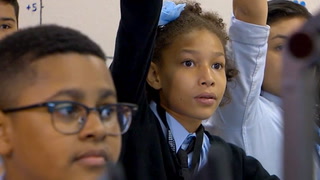
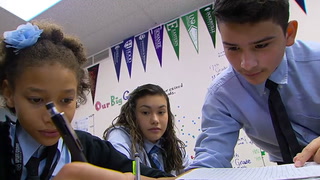
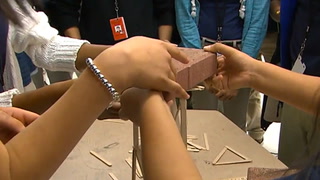
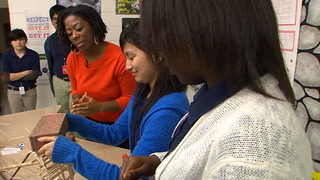
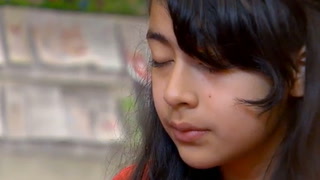
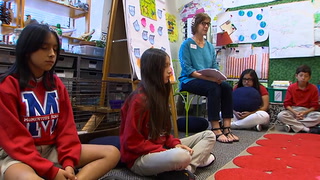
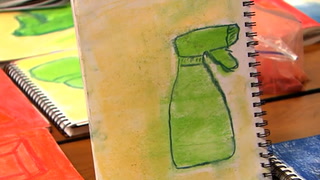
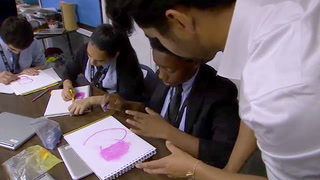
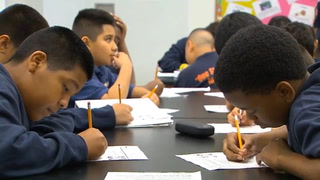
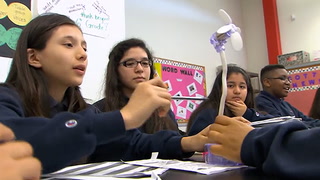









25 Comments
Marilyn Marshall Mar 5, 2023 1:15am
The video I watched was about the teacher (Ms. Mechler) talking to her students and presenting the idea of being "present". She talked about what it meant to them to be present and then asked for examples of what they each thought it meant. The ideas were different but that was what she was looking for. The teacher stated that there are different ideas of how to be present. This was a good way to check in with her students checking on everyone's Social Emotional well-being. The simple idea of "what does it mean to be present?" This idea is something to give the students a chance to write down if they had something they were concerned about. It was a stop-and-think before they went on with another lesson. A type of brain break, with no testing involved.
Malori Swenson Sep 15, 2022 9:47am
In this video, the teacher Ms. Mechler tought her students the importance of staying focus because spring break was coming up. She letted her students comuncate with others, about "what do you think is important about bring present". With her lesson today, it was helping her students build relationships with other students. And it helped her students stay focus, so they can be perpare for the day and calm down.
Victoria Schwab Sep 14, 2022 10:42pm
This video is a great example of building a relationship with the students and helping them relax and get them used to there emotions. Having mindful lessons help the students become comfortable and talk about how this happened to them. This will also help them to be mindful of others. But this is also beneficial to the teacher. The teacher will build a stronger connection with the students as they trust her/her. Calming a kid down by having them focus on there breathe will help them be prepared for the day and not be so stressed about the day or events.
Stalp Joyce Sep 12, 2022 8:12pm
This is a great video on being present and social and emotional learning.
Allie Harrison May 29, 2021 5:59pm
The teacher decided to focus on mindfulness because it was May 1st and she knew that sometimes students loose focus and go on "vacation" mode before school is out. One of the strategies used was the visualution strategy where she had students close their eyes and do a boy scan. The teacher feels it is important because she says if they are focused and present, they are learning.